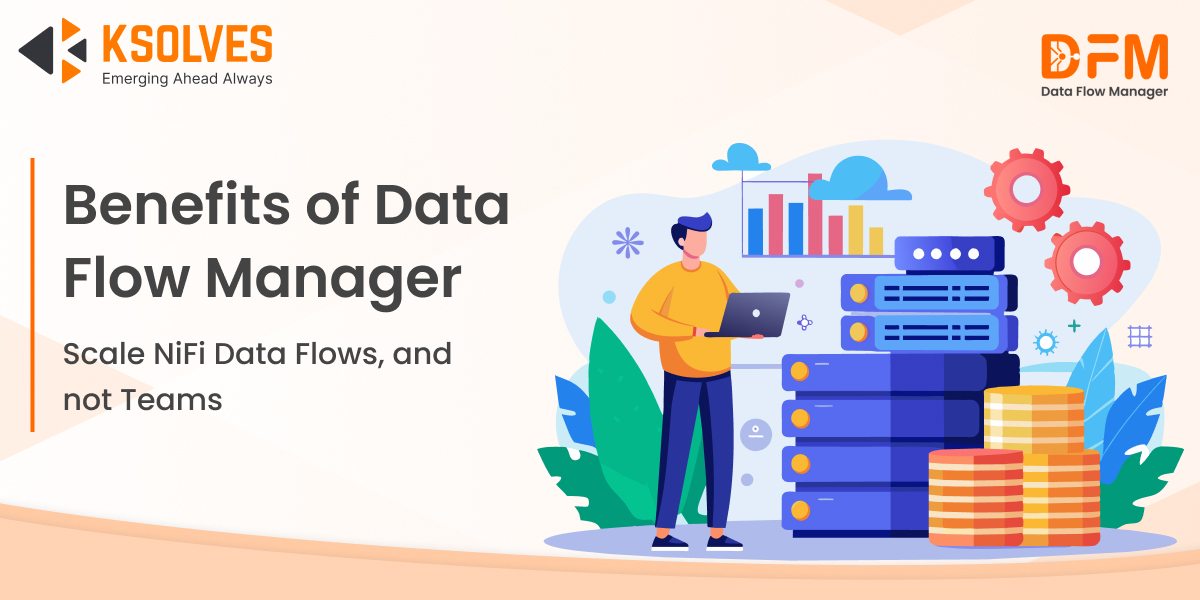Top 7 Benefits of Data Flow Manager for Businesses
![]()

With growing market demands, enterprises are under constant pressure to accelerate innovation, reduce operational costs, and scale infrastructure. Apache NiFi has emerged as a go-to solution for building robust, scalable data pipelines, but managing and deploying NiFi flows still comes with its own set of challenges.
As organizations scale, many find themselves entangled in operational bottlenecks, team silos, and rising demand for NiFi-specific expertise. That’s where Data Flow Manager steps in – a game-changing solution for on-premise Apache NiFi designed to automate NiFi flow deployment and promotion across clusters.
In this blog, we explore how Data Flow Manager helps businesses unlock efficiency, reduce costs, and scale data operations – all without scaling NiFi expert headcount.
The Traditional Bottlenecks for NiFi Data Flow Deployment
Apache NiFi is a widely adopted solution for orchestrating and managing data flows. Its drag-and-drop interface and visual flow design make it approachable, but managing large NiFi data flow deployments at scale still demands niche expertise.
Organizations often rely on a handful of “NiFi power users” or dedicated platform engineers who handle flow deployments, environment configuration, versioning, rollback, and monitoring.
This creates several bottlenecks:
- Limited deployment velocity due to reliance on centralized teams.
- High onboarding costs for new engineers needing NiFi training.
- Increased operational burden on IT for monitoring and managing deployments.
- Scalability constraints when expanding to multiple teams or business units.
These issues not only increase time-to-value for data projects but also introduce unnecessary risks and overhead.
Introducing Data Flow Manager
Data Flow Manager is a powerful tool designed for on-premise NiFi to deploy and promote data flows across multiple clusters in minutes. Unlike using the NiFi UI, which requires manual interventions and deep NiFi expertise, Data Flow Manager empowers even non-technical teams to deploy and promote NiFi data flows with ease.
With features like flow deployment scheduling, audit logs, version control & rollback, role-based access, and an AI-powered flow creation assistant, Data Flow Manager simplifies the entire NiFi flow lifecycle.
Top 7 Benefits of Data Flow Manager for Businesses
Let’s dive into the key advantages of implementing Data Flow Manager for your business.
1. Reduced Need for Specialized NiFi Talent
Hiring and retaining NiFi specialists is not only expensive — it’s also unsustainable as flow complexity and usage increase. Data Flow Manager eliminates this constraint by allowing existing developers or platform engineers to deploy and promote NiFi data flows in minutes.
Moreover, Data Flow Manager automates and centralizes administrative tasks like controller service management, versioning, rollback, and scheduling, freeing up valuable time and headcount.
2. Enablement Without Special Training
One of the standout features of Data Flow Manager is its self-service NiFi flow deployment portal. This gives cross-functional teams the power to manage and deploy NiFi flows on their own — no NiFi expertise required.
This democratizes access, reduces onboarding time for new engineers, and eliminates tribal knowledge dependencies that typically rest with a handful of “NiFi power users.”
3. Operational Efficiency for IT Teams
IT operations teams are often stretched thin, constantly firefighting flow deployment issues and supporting ad-hoc requests. Data Flow Manager drastically reduces their burden by introducing:
- Effortless NiFi data flow deployment
- Built-in approvals for governance
- Audit trails for compliance
- Monitoring dashboards for proactive alerts
- Centralized scheduling and version rollback to avoid production mishaps
These features ensure smooth, reliable deployments, even during off-hours or across global teams.
4. Sustainable Scalability Without Team Expansion
One of the biggest challenges enterprises face is the need to grow their infrastructure without growing their team. Data Flow Manager solves this by:
- Enabling horizontal scaling of NiFi flows across departments
- Decoupling team size from flow volume
- Supporting multi-cluster, multi-tenant environments with centralized management
5. Business-Centric Development Focus
With Data Flow Manager, developers can focus on business logic and data transformation instead of worrying about deployment scripts and operational workflows. Platform engineers, in turn, can focus on governance, performance, and security rather than repetitive manual tasks.
This leads to a more aligned, efficient system where each team plays to its strengths.
6. Faster Time-to-Market
In the current business climate, speed is everything. Data Flow Manager dramatically reduces time-to-market by:
- Skipping the NiFi UI and controller services for NiFi flow deployment.
- Reducing wait time for expert reviews or approvals.
- Supporting seamless promotion from development to staging to production.
This agility allows businesses to respond faster to changing market conditions, regulatory requirements, or customer demands.
7. Future-Proofing Data Operations
Data Flow Manager is built for flexibility and forward compatibility. If you’re working in a fully on-premise environment, it supports evolving enterprise needs.
Features like role-based access control, version rollback, and detailed audit logs make it ready for tomorrow’s challenges.
A Closer Look: Use Case Scenario
Let’s say your marketing, finance, and customer service departments all need their own data pipelines for reporting and analytics. Traditionally, each team would rely on a small data ops team to:
- Create the flow with the NiFi UI
- Configure services
- Push to the right NiFi environment
- Monitor the pipeline
With Data Flow Manager:
- Each team logs into the target cluster and selects their flow
- Approvals are built-in and governed by policies
- Version control ensures traceability
- Scheduling is handled centrally, reducing off-hour risks
- If something fails, rollback is a click away
What once took hours or even days now takes minutes, with zero support tickets for the IT operations team and zero firefighting.
Conclusion
In an era where data is both an asset and a competitive edge, the ability to manage its flow efficiently, without overwhelming your teams, is no longer optional; it’s essential.
Data Flow Manager isn’t just another operational tool – it’s a strategic enabler that aligns with your growth ambitions. By eliminating the need for specialized talent, empowering cross-functional teams, streamlining IT operations, and enabling horizontal scalability, Data Flow Manager lets you achieve more with the resources you already have.
For business leaders and technology executives, this means faster innovation, greater agility, and measurable cost savings – without compromising on control, governance, or reliability.
![]()

